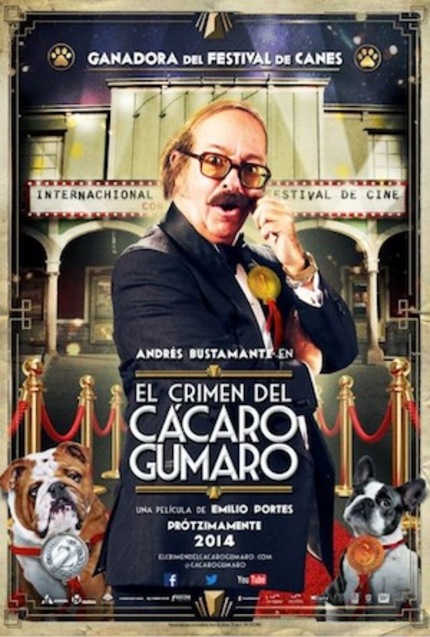Review: EL CRIMEN DEL CÁCARO GUMARO, A Collection Of Lazy, Juvenile Jokes

El Crimen del Cácaro Gumaro was, on paper, a much welcomed movie for Mexican cinema. In a period when "art films" are winning prestigious awards internationally (i.e. Post Tenebras Lux and Heli at Cannes) and the number of film festivals keep growing in the country, a movie that pokes fun at "serious" filmmaking was just a matter of time.
Pastorela's Emilo Portes teamed with Armando Vega Gil (bass player of the rock band Botellita de Jerez and writer) and renowned television comedian Andrés Bustamante to write a script full of pop culture references, current issues and many, many jokes that could function as hilarious entertainment and, at the same time, say something clever about the Mexican film industry.
The movie, however, is far from being to Mexican cinema what Herod's Law (La Ley de Herodes) was to Mexican politics. In other words, this is not very intelligent, and one can begin realizing that from the very first scene: a parody of Alejandro Gonzalez Iñárritu's Amores Perros. El Crimen del Cácaro Gumaro uses footage of the first Amores Perros sequence (the car chase) but instead of seeing Gael García and Humberto Busto we get, well, a couple of dogs. Two talking dogs are driving in Mexico City in what is one of the many irrelevant mini-movie parodies Portes and his team created.
Because El Crimen del Cácaro Gumaro is set around an old cinema, we get to watch movies within the movie. In consequence, this is partly a fragmented collection of gags with references to the giant-monster films, zombies, and more. It is one of those where all the crazy movie stuff that the characters are watching on the screen can become their reality, even if the reasons don't make much sense. The narrative side of it works from a premise as simple as a spoof flick requires: the owner of the town's movie theater passes away and one of his two sons (Gumaro) inherits the cinema, while the other (Archimboldo) might not be pleased with this decision. It is a fight between brothers, with the corrupt mayor of the town (Andrés Bustamante) in the middle of it.
Portes brings some interesting ideas. For instance, Archimboldo will try to put his brother's movie theater out of business by selling pirate DVDs outside of it. You just have to visit Mexico City's Cineteca Nacional to see this situation in real-life as the pirates across the street are always selling the same movies that the Cinematheque is playing! Another cool idea is the aforementioned take on the festival and art circuit. In El Crimen del Cácaro Gumaro, a Carlos Reygadas film can bore the moviegoers until death, literally. But for every fair gag, there are at least five dumb and obvious ones.
This has to be Portes' most juvenile movie so far, but it is not a delightfully crazy and funny immaturity. There's a Looney Tunes feel, though it doesn't work for this live-action effort, and seeing situations like Gumaro locking his brother inside a bathroom by putting Acme-like glue to the door was disappointing. Visually, Portes also goes for the cartoonish look with exaggerated humor as if Gumaro was Wile E. Coyote himself.
Vega Gil's band Botellita de Jerez used to write songs that played with the language, using double-meaning words, in a way that (I think) only Mexicans can get. The film tries something similar and, indeed, some dialog and humor is very local. There are "albures" (i.e. the parody title of Cinco Días Sin Nora, aka Nora's Will, is Cinco Días Sin Ñonga -- the literal translation would be "five days without dick/cock"), words taken from Mexican YouTube stars (i.e. "el Canaca"), and classist humor that pokes fun at bad English pronunciation (something now very common, recently exploited in Fachon Models). It is lazy material and, certainly, nothing comes close to a well-written Botellita de Jerez song.
Bustamante's character offers a view of Mexican bureaucracy through only one principal gag, becoming a repetitive element rather than a brilliant film debut for the comedian. In that way, the many cameos by TV personalities that the trailer promised aren't a big distraction but neither a hilarious attraction. Still, there's one particularly baffling bit with Televisa's Chabelo and a recognizable film reviewer in what is a minor homage to Kaiju and Mecha battles.
While El Crimen del Cácaro Gumaro might find its way to referencing the Mexican "sexy comedies" from the seventies and eighties in an ingenious manner, it also has, for example, the senseless, tasteless decision of mixing Guillermo del Toro's Pan's Labyrinth (El Laberinto del Fauno) with pop singer Paulina Rubio in order to create the character "Faunlina Rubio." Is that hilarious stuff? I really don't think so. In the end, Portes' third feature length film repeats itself so much that is no less boring than the least interesting "art films where nothing happens."
El Crimen del Cácaro Gumaro opened in Mexico on Friday, March 14.







